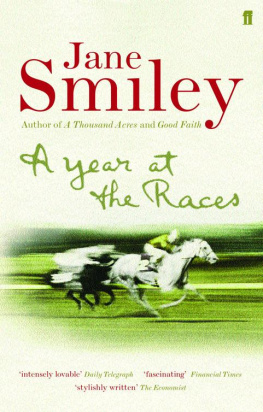Jane Smiley - The Age of Grief
Here you can read online Jane Smiley - The Age of Grief full text of the book (entire story) in english for free. Download pdf and epub, get meaning, cover and reviews about this ebook. year: 2002, publisher: Anchor, genre: Art. Description of the work, (preface) as well as reviews are available. Best literature library LitArk.com created for fans of good reading and offers a wide selection of genres:
Romance novel
Science fiction
Adventure
Detective
Science
History
Home and family
Prose
Art
Politics
Computer
Non-fiction
Religion
Business
Children
Humor
Choose a favorite category and find really read worthwhile books. Enjoy immersion in the world of imagination, feel the emotions of the characters or learn something new for yourself, make an fascinating discovery.

- Book:The Age of Grief
- Author:
- Publisher:Anchor
- Genre:
- Year:2002
- Rating:4 / 5
- Favourites:Add to favourites
- Your mark:
- 80
- 1
- 2
- 3
- 4
- 5
The Age of Grief: summary, description and annotation
We offer to read an annotation, description, summary or preface (depends on what the author of the book "The Age of Grief" wrote himself). If you haven't found the necessary information about the book — write in the comments, we will try to find it.
The Age of Grief — read online for free the complete book (whole text) full work
Below is the text of the book, divided by pages. System saving the place of the last page read, allows you to conveniently read the book "The Age of Grief" online for free, without having to search again every time where you left off. Put a bookmark, and you can go to the page where you finished reading at any time.
Font size:
Interval:
Bookmark:

THE AGE OF GRIEF
Impressive. Sharp portraits of marriages and other family-style relationships. Smiley makes it all happen with the unobtrusive control that one comes to rely on her for.
The Wall Street Journal
An absorbing collection.
Newsday
The author masterfully creates convincing, sympathetic characters and compelling situations. Her graceful, sincere style illuminates delicate internal perceptions and memories, creating vivid images for our deepest fears and dreariest routines.
San Francisco Chronicle
Artful. Smiley is equally adept at probing the inner lives of her characters and simultaneously anchoring them in externalized reality. And because she usually eschews exotic characters, most of us can comprehend what she is driving at in terms of our own lives.
The Kansas City Star
THE AGE OF GRIEF
Jane Smiley is the author of ten works of fiction, including The Greenlanders, Ordinary Love & Good Will, A Thousand Acres (for which she was awarded the Pulitzer Prize and the National Book Critics Circle Award), Moo, and Horse Heaven. She lives in northern California.
Horse Heaven
The All-True Travels and Adventures of Lidie Newton
Moo
A Thousand Acres
Ordinary Love & Good Will
Catskill Crafts
The Greenlanders
Duplicate Keys
At Paradise Gate
Barn Blind

FIRST ANCHOR BOOKS EDITION, JUNE 2002
Copyright 1977, 1981, 1984, 1986, 1987 by Jane Smiley
All rights reserved under International and Pan-American Copyright Conventions. Published in the United States by Anchor Books, a division of Random House, Inc., New York, and simultaneously in Canada by Random House of Canada Limited, Toronto. Originally published in hardcover in the United States by Alfred A. Knopf, a division of Random House, Inc., New York, in 1987.
Some stories in this work were originally published in the following publications: The Atlantic, Mademoiselle, and TriQuarterly.
The Age of Grief was originally published in The Quarterly, Vol. I, Spring 1987. Copyright 1987 by Jane Smiley.
Anchor Books and colophon are registered trademarks of Random House, Inc.
The Library of Congress has cataloged the Knopf edition as follows:
Smiley, Jane.
The age of grief.
eISBN: 978-0-307-78727-9
I. Title.
PS3569.M39A7 1987 813.54 87-45120
www.anchorbooks.com
v3.1
Her Company
W hen Florence comes up the sidewalk toward her duplex, she can see that the large Victorian house just to the south has new owners. It is the one lovely place on her otherwise undistinguished blockporched, corniced, many-peaked, and recently painted Nordic blond with piqu white trim. Each of these last few evenings she has admired, as she does tonight, how neatly the trim glows in the twilight. She threads her way past boxes and pieces of furniture the owners have left on the sidewalk. There are two piles of womens clothing. Dishes and cutlery are stacked beside the curb, and a slender-legged plant stand supports two ferns and a grape ivy. A brown box, its lid agape, contains the Oxford English Dictionary, abridged edition, and two Mexican cookbooks. Draped over the back of a kitchen chair is a white dress, perhaps a wedding dress, its bodice shaped into fullness with blue tissue paper. One of its stiff lace cap sleeves has fallen off the hanger. As Florence notices this, a breeze lifts the skirt. She rearranges the sleeve on the hanger and, shy of being caught, hurries the rest of the way home. In the morning when she turns with her coffee cup to gaze out the window of her kitchen, the items are still on the lawn. The dress has fallen off the chair and lies spread on the green grass like a snow angel.
While she is at work, everything disappears, and that night, at last, there are lights in the windows; the stained glass she has coveted for years bejewels the darkness. There is more to covet, or at least envy, when she finally meets the HowardsPhilip and Frannie. Two handmade orange rugs are flung on the hardwood floors and three or four large paintings, stretched but unframed, furnish the wide walls. There are plants. Mostly, however, there is space, so much pale floor that the rooms, as she looks through to the back porch, fit across one another like layers, inexhaustible, promising, culminating in sunlight.
Frannie has copper-colored eyes, winged brows, and short, springy hair that she obviously does no more to than wash into shape. She asks Florence to sit at the round maple table for tea. Everything about Frannie, from her clumsiness with the teacups to her delight with the muffins Florence has brought for housewarming, is inviting. There is a footstep, and Frannie glances up, then takes out another plate. Hello! says Philip, but before he sits down, he strides around the periphery of the room, stopping twice to admire the walls and floors, to look through the open door to the front porch, to smile and put his hands on his hips. Frannie says, Philip still cant believe we own the place. Last night I found him out on the front porch holding on to the gingerbread and staring at the stained glass.
Philip sits at the table and leans toward Florence on his elbows. Have you ever house-hunted? You wouldnt believe what some people do to their houses. I went to one place that looked rather charming from the outside, you know, but inside theyd cut doorways where they shouldnt have been and added on this room at the back, plastic paneling, spongy rug like fungus. It wasnt a bad house, at one time. I went outside and threw up in a trash barrel.
Philip took house-hunting very seriously, says Frannie.
You see how people live. He butters a muffin.
Philip, it turns out, was in high school with Florences brother. Philip tells them that no two strangers in the nation are separated by more than five intermediate acquaintances. When he finds out that Florence is a nurse, he asks her if she saves a life every day, and when Frannie mentions her job, directing foreign exchange programs and charter flights for the local university, he says, Importing exotica, exporting domestica. He obviously expects to fill air and space, and he is quite handsome, but it is Frannie that Florence cant help looking at. She sits smiling over the conversation like a child over a jack-in-the-box, waiting to be surprised into laughter. She makes Florence long to say something hilarious.
Florence goes next door, thinking that she really shouldnt be visiting again so soon. She has been there every day, sometimes twice, since they moved in two weeks ago. She brings a quarter pound of a new kind of tea, knowing that it is almost a bribe, and shouts a comical YOO-hoo! as she crosses the threshold. Frannie giggles from the side porch and responds in kind. The giggle is a tremendous relief to Florence, because she is ready to detect signs of boredom and exasperation in Frannies first glance at her. The giggle allays her fears, and she grins as she pulls out a maple chair beside the maple table once again, investing the moment with her fullest, most tangible pleasure at being liked. Philip isnt there.
Font size:
Interval:
Bookmark:
Similar books «The Age of Grief»
Look at similar books to The Age of Grief. We have selected literature similar in name and meaning in the hope of providing readers with more options to find new, interesting, not yet read works.
Discussion, reviews of the book The Age of Grief and just readers' own opinions. Leave your comments, write what you think about the work, its meaning or the main characters. Specify what exactly you liked and what you didn't like, and why you think so.







